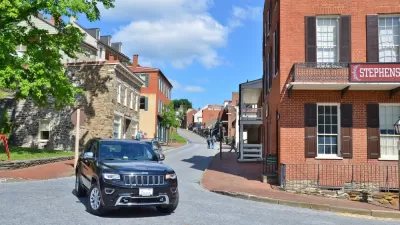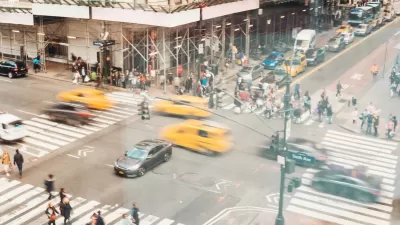The lack of a nationwide standard and extensive officer discretion lead to inconsistent data when it comes to traffic crashes and fatalities.

On the heels of "an explosive Washington, D.C., study that showed police had failed to record as much as 30 percent of 911 calls about drivers striking pedestrians, bicyclists, and other road users, with crashes going unreported most often in Black and brown neighborhoods," reports Kea Wilson. Advocates in Washington, D.C., for example, "say that as much as 40 percent of crashes in mostly Black areas may go uncounted — so District leaders may not even know where its most dangerous corridors are, much less have the specific data they need to fix them."
This underreporting of crashes, writes Wilson, "isn’t the only reason why U.S. communities don’t have a full picture of our national traffic-violence epidemic." Other important factors include: the lack of a federal crash-reporting standard; the flawed standard currently recommended by the National Highway Traffic Safety Administration (NHTSA), which omits important details such as "how far a walker who’s struck by a driver might be from the nearest unobstructed crosswalk" and vehicle height and weight; and the amount of discretion officers have in choosing what information to collect and report.
Rohit T. Aggarwala, senior fellow at Cornell Tech and author of an op-ed encouraging Secretary Buttigieg to reform the Fatality Analysis and Reporting System (FARS), "hopes that, with the right reforms, much subjectivity can be stripped from crash reporting" so cities can have more accurate data when making Vision Zero plans.
FULL STORY: Why U.S. Car Crash Reporting Is Broken

Planetizen Federal Action Tracker
A weekly monitor of how Trump’s orders and actions are impacting planners and planning in America.

Restaurant Patios Were a Pandemic Win — Why Were They so Hard to Keep?
Social distancing requirements and changes in travel patterns prompted cities to pilot new uses for street and sidewalk space. Then it got complicated.

Maui's Vacation Rental Debate Turns Ugly
Verbal attacks, misinformation campaigns and fistfights plague a high-stakes debate to convert thousands of vacation rentals into long-term housing.

In California Battle of Housing vs. Environment, Housing Just Won
A new state law significantly limits the power of CEQA, an environmental review law that served as a powerful tool for blocking new development.

Boulder Eliminates Parking Minimums Citywide
Officials estimate the cost of building a single underground parking space at up to $100,000.

Orange County, Florida Adopts Largest US “Sprawl Repair” Code
The ‘Orange Code’ seeks to rectify decades of sprawl-inducing, car-oriented development.
Urban Design for Planners 1: Software Tools
This six-course series explores essential urban design concepts using open source software and equips planners with the tools they need to participate fully in the urban design process.
Planning for Universal Design
Learn the tools for implementing Universal Design in planning regulations.
Heyer Gruel & Associates PA
JM Goldson LLC
Custer County Colorado
City of Camden Redevelopment Agency
City of Astoria
Transportation Research & Education Center (TREC) at Portland State University
Camden Redevelopment Agency
City of Claremont
Municipality of Princeton (NJ)





























